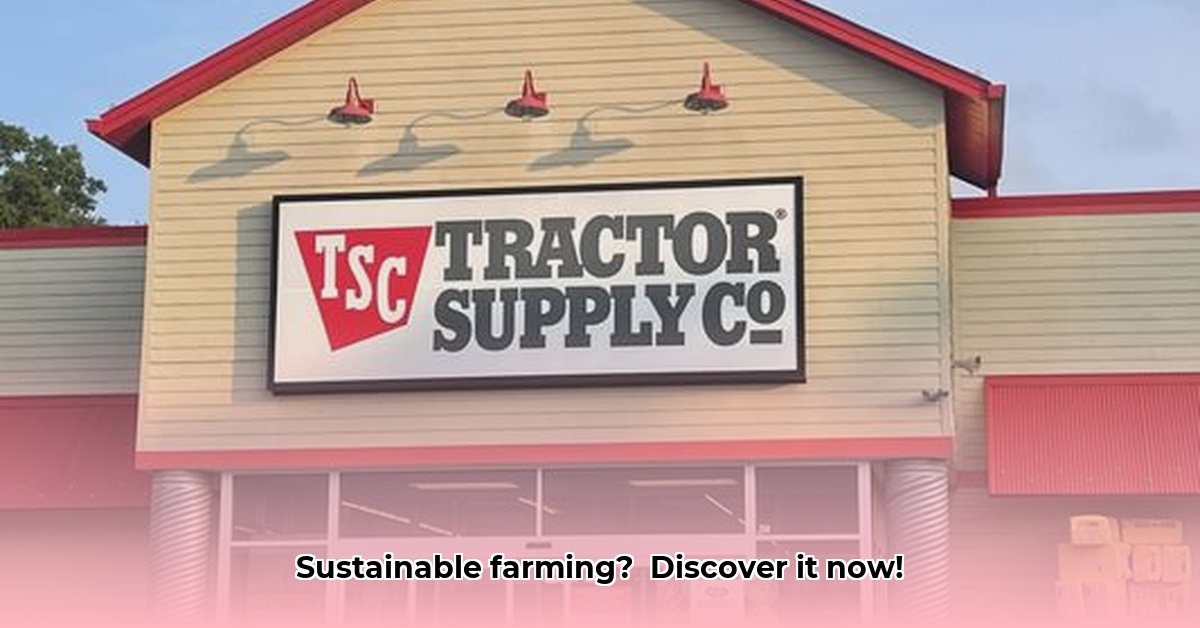
Tractor Supply's Role in Sustainable Agriculture in Manchester, CT: An Assessment
Tractor Supply Company (TSC) plays a multifaceted role in the sustainability landscape of Manchester, CT's agricultural sector. While providing convenient access to a range of farming supplies, its overall contribution to sustainable practices requires careful examination. This article analyzes TSC's current impact, identifies areas for improvement, and proposes actionable steps for both the company and local farmers to foster a greener future. How can we better leverage existing resources to promote truly sustainable farming in our community? For more information on TSC's sustainability initiatives, check out their greenhouse program.
Getting a Clearer Picture: Transparency and Environmental Impact
TSC's Manchester location offers a wide array of goods, from organic seeds to water-efficient irrigation systems, supporting local food production and potentially reducing reliance on large-scale, often less environmentally friendly operations. However, a critical gap exists in transparency regarding its own environmental footprint. Data on supply chain sustainability, including sourcing practices and life-cycle assessments (LCA) (a detailed analysis of a product's environmental impact throughout its entire lifecycle), is crucial for a complete evaluation. Without this information, it's difficult to assess TSC's true contribution to sustainable agriculture. What steps are they taking to reduce their emissions from transportation, building operations, or manufacturing?
Steps Toward a Greener Future: Actionable Recommendations
To significantly enhance its impact, TSC and the wider community need to implement several key strategies:
For Tractor Supply:
Conduct a Comprehensive LCA: A thorough LCA of TSC's most popular products is essential to identify environmental hotspots and guide improvements across the supply chain. This should encompass everything from material sourcing to product disposal.
Develop a Robust Sustainability Plan: This plan should include specific, measurable, achievable, relevant, and time-bound (SMART) goals for reducing carbon emissions, improving material sourcing, and minimizing waste. Public reporting on progress against these targets would foster accountability.
Enhance Operational Transparency: Increased transparency is key. Publicly available reports detailing sustainability initiatives, including independent third-party audits of suppliers, are crucial for building trust and credibility. This open approach helps consumers make more informed, environmentally conscious purchasing decisions.
For Local Farmers and Gardeners:
Utilize Available Resources: TSC provides educational resources and expert advice. Actively engaging with these resources empowers farmers and gardeners to adopt more sustainable farming practices.
Prioritize Sustainable Products: Making conscious purchasing decisions—choosing sustainably sourced products whenever feasible—contributes significantly to a greener farming system. Even small changes can have a cumulative effect.
Advocate for Sustainable Policies: Supporting policies at local and national levels that incentivize sustainable agriculture practices is vital – this includes contacting elected officials and joining relevant advocacy organizations.
Navigating Potential Challenges: A Proactive Approach
Several challenges could hamper progress towards sustainable agriculture. Proactive strategies are needed to address these:
| Risk Factor | Likelihood | Potential Impact | Mitigation Strategies |
|---|---|---|---|
| Lack of supply chain transparency | High | Moderate Negative Impact | Implement independent, third-party audits of the entire supply chain. |
| Sourcing unsustainable materials | Moderate | Moderate Negative Impact | Transition to more sustainable and ethically sourced materials; explore alternatives. |
| Limited reach to all farmers | Moderate | Low Negative Impact | Expand outreach programs, increase online accessibility, and offer more training. |
| Consumer demand for sustainability | Moderate | Low Negative Impact | Public education campaigns to raise awareness and promote sustainable choices. |
| Insufficient reporting | High | Moderate Negative Impact | Comprehensive and transparent sustainability reporting with regular updates. |
How Does Tractor Supply Contribute to Sustainable Farming Practices for Small-Scale Farmers?
TSC's contribution to sustainable small-scale farming is primarily through product availability. However, its success hinges on farmers embracing those sustainable options. Financial constraints and a lack of knowledge can hinder adoption.
“Tractor Supply’s role is significant, but indirect,” says Dr. Emily Carter, Professor of Sustainable Agriculture at the University of Connecticut. “Providing access to sustainable products is crucial, but it necessitates farmer education and supportive policy.”
To maximize impact, TSC should actively partner with local organizations to provide training, financial assistance, and resources to support the transition to more sustainable practices. This collaboration is key to fostering a sustainable agricultural ecosystem.
Key Takeaways: TSC’s potential for fostering sustainable agriculture in Manchester is significant but requires proactive measures. Enhanced transparency, a robust sustainability plan, and collaborative partnerships are crucial for realizing this potential. The journey towards sustainable farming requires collective effort and ongoing commitment from all stakeholders.